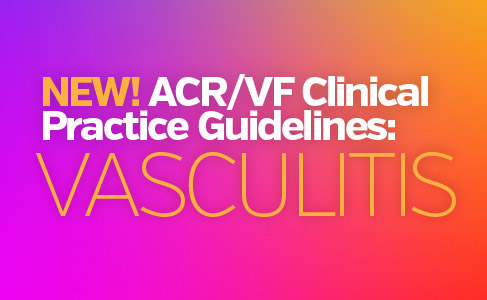Blog
The American College of Rheumatology/Vasculitis Foundation Release Three New Guidelines for Treatment of Vasculitis

FOR IMMEDIATE RELEASE
July 9, 2021
Media Contact
Amanda Head (Corna)
[email protected]
404-679-5330
The American College of Rheumatology/Vasculitis Foundation Release Three New Guidelines for Treatment of Vasculitis
ATLANTA — The American College of Rheumatology (ACR), in partnership with the Vasculitis Foundation (VF), released three new guidelines for the treatment and management of systemic vasculitis. Vasculitis is a group of about 20 rare diseases that have inflammation of blood vessels in common, which can restrict blood flow and damage vital organs. The three guidelines cover six forms of vasculitis, and a fourth guideline on Kawasaki disease will be released in the coming weeks.
“Many rheumatologists may have limited experience caring for patients with these diseases,” said Dr. Sharon Chung, Director of the Vasculitis Clinic at the University of California, San Francisco, and the lead investigator of the guidelines. “However, the treatment options for patients with vasculitis have expanded in recent years. Thus, these guidelines provide practitioners evidence-based recommendations to help navigate the treatment path for their patients.”
The guideline for giant cell arteritis (GCA) and Takayasu arteritis (TAK), both forms of large vessel vasculitis, provides a total of 42 recommendations and three ungraded position statements. The recommendations and statements address clinical questions relating to the use of diagnostic testing (including imaging), treatments, and surgical interventions in GCA and TAK. Recommendations for GCA support the use of glucocorticoid-sparing immunosuppressive agents and the use of imaging to identify large vessel involvement. Recommendations for TAK include the use of non-glucocorticoid immunosuppressive agents with glucocorticoids as initial therapy.
The guideline for polyarteritis nodosa (PAN), a medium vessel vasculitis, provides a total of 16 recommendations and one ungraded position statement. The recommendations support early treatment of severe PAN with cyclophosphamide and glucocorticoids, limiting toxicity through minimizing long-term exposure to both treatments, and the use of imaging and tissue biopsy for disease diagnosis. The recommendations endorse minimizing risk to the patient by using established therapy at the start of the disease and identify new areas where adjunctive therapy may be warranted.
The guideline for antineutrophil cytoplasmic antibody–associated vasculitis (AAV), a small vessel vasculitis, provides a total of 41 recommendations and 10 ungraded position statements for granulomatosis with polyangiitis (GPA), microscopic polyangiitis (MPA), and eosinophilic granulomatosis with polyangiitis (EGPA). According to the VF, the overall, worldwide incidence of AAV ranges from 0.5.-20 cases per 1 million people. In children, the incidence ranges from 0.45-6.4 cases per 1 million children per year. The guideline provides recommendations for remission induction and maintenance therapy as well as adjunctive treatment strategies in GPA, MPA, and EGPA. The recommendations include the use of rituximab for remission induction and maintenance in severe GPA and MPA and the use of mepolizumab in non-severe EGPA.
These new guidelines are the first produced and endorsed by the ACR and the VF. The organizations hope the guidelines will help providers better understand and treat the various forms of vasculitis.
“Different forms of vasculitis can have similar symptoms and treatment regimens; however, each disease is distinct, “said Joyce Kullman, Executive Director of the Vasculitis Foundation. “These guidelines will hopefully take some of the guesswork out of determining which treatments might work best for newly diagnosed patients, or patients who have been under treatment for a while without success.”
As much as the guidelines highlight what evidence-based knowledge exists for the treatment and management of vasculitis, they also shine a light on what work needs to be done.
“We identified knowledge gaps that would benefit from additional research, like comparative effectiveness trials, longitudinal studies of imaging modalities, and identification of biomarkers to inform disease activity assessments,” said Dr. Chung. “We hope this fuels research in these areas to facilitate patient care.”
Like many other ACR guidelines, the three guidelines for vasculitis were developed using Grading of Recommendations Assessment, Development and Evaluation (GRADE) methodology, which creates rigorous standards for judging the quality of the literature available and assigns strengths to the recommendations. Most of the recommendations in the guidelines are conditional because of the rarity of these diseases. The papers containing the full list of recommendations and supporting evidence is available at on the ACR website.
For general information on the guidelines, visit the VF website: https://www.vasculitisfoundation.org/2021-acr-vf-vasculitis-guidelines/
About the American College of Rheumatology
Founded in 1934, the American College of Rheumatology (ACR) is a not-for-profit, professional association committed to advancing the specialty of rheumatology that serves over 7,700 physicians, health professionals, and scientists worldwide. In doing so, the ACR offers education, research, advocacy and practice management support to help its members continue their innovative work and provide quality patient care. Rheumatology professionals are experts in the diagnosis, management and treatment of more than 100 different types of arthritis and rheumatic diseases. For more information, visit www.rheumatology.org.
About the Vasculitis Foundation
The Vasculitis Foundation (VF) is the international advocacy organization for people with vasculitis and has funded over 50 research studies, providing $2.7 million in funding. The VF is a central partner to a productive collaboration between patients, academic clinical investigators, and funding organizations conducting high-quality clinical research in vasculitis. Building upon the collective strength of the vasculitis community, the VF supports, inspires and empowers individuals with vasculitis and their families through a wide range of education, research, clinical, and awareness initiatives. For more information, visit www.vasculitisfoundation.org

